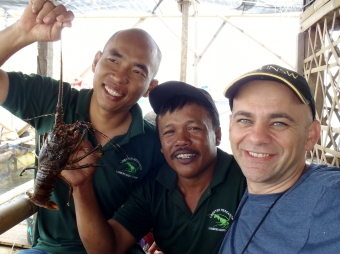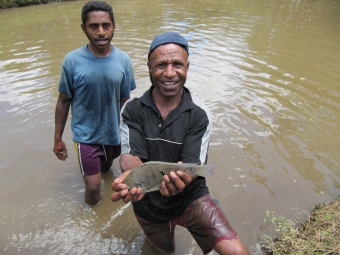What does your project aim to do and why is it important?
I work on a program of research to improve food and income security, creating livelihood options through the development of sustainable aquaculture practices in the Asia-Pacific. My program of research partners with government agencies, NGOs and communities to introduce scientifically-validated, culturally-acceptable, low-cost technologies that enables local communities to farm fish to feed their families and to scale up production to generate income.
The overall objectives of our program builds technical and farming capacity for local farmers. These activities develop and test technologies that are farmer friendly, environmentally sustainable and significantly reduce the cost of farming.
We also work on developing low-cost fish feeds, fish husbandry, efficient production systems, fingerling production methods, and better broodstock management practices, and translate research into policy and extension support.
What are you currently working on?
After completing 25 years of projects on aquaculture research and development in Indonesia, I am now focussing on improving fish nutrition and fingerling production for inland fish farming in PNG and developing better management strategies for rice and shrimp farming in Vietnam.
I am also developing two new ACIAR-funded projects. One is on scaling up fish farming and developing sustainable reservoir-based cage culture of fish, and the other is a major project involving institutional strengthening and scientific capacity building of the National Fisheries Authority (NFA) of PNG.
How do you engage with local communities?
In Papua New Guinea, I work through and with the National Fisheries Authority to train communities in fish farming methods. For example, the ACIAR-funded project team works with the National Fisheries Authority’s ‘Fish for Prisons’ and ‘Fish for Schools’ program to train prisoners and students in fish farming. We work with the Sisters of Notre Dame’s Maria Kwin Centre to share fish farming knowledge through their outreach programs and through their certificate-level training programs.
Our model is to train ‘lead farmers’ who are supported by a knowledge network in PNG to provide access to fish farming information. Our programs have also specifically supported women ostracised from society, raskol gang members, and young people.
In Vietnam, we work with communes, farmer groups, the government, research agencies and individual and lead farmers using participatory research. A video outlining Jes' work is below.
What are the key impacts of your work so far?
We have seen some great impacts from the work we are doing. Communities in Papua New Guinea tell us that fish farming has transformed their lives – children are healthier, there is more peace, relationships have improved, there is less disease, people respond to medical interventions better, income has increased and individual self-esteem increases.
Through engaging local communities, our programs have helped to reduce tribal wars by bringing adversaries together to farm fish. Our projects have also increased access to fish for over 300,000 households, and a decline in crime in areas where we have trained communities has been demonstrated.
Some of our NGO partners work with raskol gangs and women who are the victims of domestic abuse and sorcery accusation.
In our projects in Vietnam and Indonesia, local communities have built houses from the profits from fish, shrimp and lobster farming, and profits have allowed families to access better medical services and education services.
Some of my past Indonesian students are now in key advisory roles to the Minister of Fisheries in Indonesia, developing policies for fisheries and aquaculture management, and leading research centres and research projects. In PNG, my past students are leading development projects.
Sometimes working in international development can be challenging. What is your advice to others?
We face many challenges working in the field. Safety, threats to staff and theft of equipment and fish are common issues. Our work is also affected by the political landscape and environmental changes.
We have, to date, focussed on addressing issues through institutional capacity building using a work-integrated learning approach with our partner organisations. This assists in addressing the issues by strengthening local capacity and engagement with our projects.
We have found that to work in Papua New Guinea, you need to be in it for the long term, embedding projects within a program of development and research.
What is next for your project?
I have recently partnered with the PNG Tribal Foundation who will assist to facilitate and broker partnerships with reliable NGOs. This will link my project to their projects, particularly those that empower women and men, reduce violence against women and improve livelihoods in the more challenged areas of PNG.

